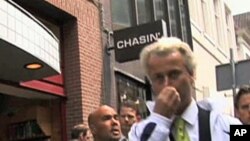Dutch voters go the polls Wednesday to elect a new government. The issue of immigration is playing high in the campaign, with the far-right 'Dutch Freedom Party' expected to finish in the top three. Our correspondent traveled to the Netherlands to find out whether the famously liberal Dutch society is taking a turn to the right.
A Roma band plays to the passing crowds outside the railway station in The Hague. People of every ethnic origin pass by on their way to work. It is a scene that fits with the Netherlands' image of a tolerant, multi-cultural society.
But as elsewhere in Europe, there is a backlash here against immigration - especially against Muslim immigrants.
Further north in the town of Zwolle, the Saturday market is suddenly overwhelmed with TV cameras and onlookers. Dutch Freedom Party leader Geert Wilders has arrived on the campaign trail. He is a striking figure - in his image and his words.
He calls the Koran a fascist book and wants an end to Muslim immigration and pay Muslim immigrants to leave the country.
"We propose a full stop of people from Islamic countries because we believe we have enough Islam in Holland - that is about it," said Geert Wilders. "I have nothing against Muslims, but I believe that Islam is a totalitarian ideology and it goes against our freedom. We are fighting for the freedom of the Netherlands and Europe and that is why we are proposing that."
Political parties across western Europe - and not just the far right - have taken up the issue. In France and Belgium, impending legislation would ban the full Muslim veil in public. In Switzerland, the government has banned the building of new minarets on mosques.
Sadik Hardouchi chairs the Forum Institute for Multicultural Affairs, a research group. He says the rise of anti-Muslim sentiment is rooted in recent history.
"The whole of Europe within this rapidly changing world of globalization, you see what the effects of the economic crisis are it begins with a mortgage in the United States and you lose your job here," said Sadik Hardouchi. "So people are searching for something to hold onto to, for certainty. So those are some of the reasons of the insecurity and the fear of what Mr. Geert Wilders is calling the 'Islamization' of Europe."
In 2008, Wilders released a film to warn about the so-called Islamization of the West.
The title Fitna means division; it intersperses quotations from the Koran with footage of terrorist acts. The film was banned in several countries; Wilders is still facing charges of inciting hatred and discrimination in the Netherlands.
In the town of Zwolle where Wilders recently campaigned, the authorities were staging a soccer tournament nearby for homeless people - many of them Muslim immigrants. We spoke to one of them about the rise of anti-Muslim sentiment.
"It is not a problem because it is a free country and you can live your life," he said. "Maybe the situation about Wilders - Wilders is playing a game. It is not the kind of thing the Netherlands looks like."
Even if Wilders remains popular - people here have mixed feelings.
"He takes advantage of the fear of people," said a woman. "I think it is very very silly what he does."
"Holland is full," said another. "And that is my opinion too - enough is enough."
Although many dismiss Wilders' views as extremist his party is attracting a share of the votes, as anti-Muslim feeling finds its way to the ballot box.












